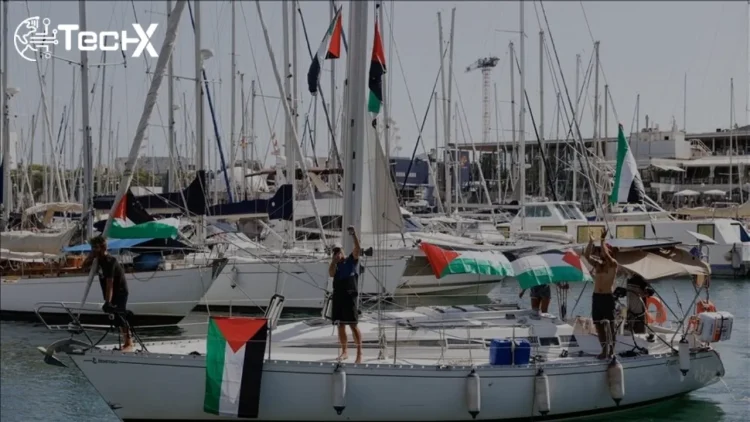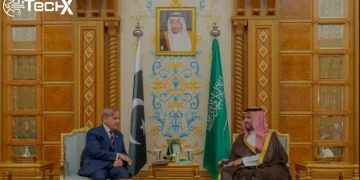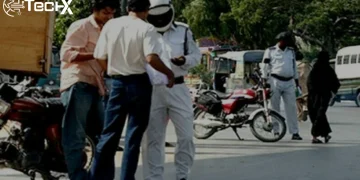The Global Sumud Flotilla has been described as the largest civilian maritime mission so far to challenge the long-standing Israeli blockade of Gaza. It brought together politicians, activists, and human rights defenders from across the world. Despite its peaceful aims of highlighting Gaza’s humanitarian crisis, the flotilla was intercepted by the Israeli navy, sparking global outrage and diplomatic tensions.
Size and Participants of the Flotilla
The flotilla was made up of 45 to 50 small vessels, each carrying people united in solidarity with the people of Gaza. In total, around 500 participants from more than 40 countries joined the mission.
Some of the most notable figures included:
- Former Pakistani Senator Mushtaq Ahmed Khan, who led the Pakistani delegation.
- Greta Thunberg, a Swedish climate activist known worldwide for her environmental advocacy.
- Mandla Mandela, grandson of Nelson Mandela, is representing the historic anti-apartheid struggle.
This diverse group of passengers included politicians, doctors, humanitarian workers, religious leaders, and activists who wanted to draw global attention to Gaza’s plight.
Goal of the Flotilla
The primary goal of the Global Sumud Flotilla was symbolic but powerful. The mission aimed to:
- Deliver a small quantity of humanitarian aid such as food and medicine.
- Highlight the humanitarian crisis in Gaza, which has been under a strict Israeli blockade for 18 years.
- Press for the creation of a maritime humanitarian corridor, allowing international aid to reach Gaza safely by sea.
Organizers made it clear that this was not just about delivering aid, it was about breaking the silence around Gaza’s suffering and making the world pay attention.
Journey from Spain to the Eastern Mediterranean
The flotilla’s core ships set sail from Barcelona, Spain, in late August/early September 2025. The journey was difficult from the start.
According to organizers:
- The ships faced drone attacks in the Mediterranean.
- Communications were repeatedly jammed.
- Unidentified objects were dropped near the vessels to intimidate passengers.
Despite these challenges, the participants remained committed to their cause. Their resolve symbolized the very word “Sumud,” which means steadfastness in Arabic.
Israeli Interception at Sea
The Israeli navy finally moved in when the ships approached Gaza’s waters. At least 19 vessels were intercepted in international waters, raising immediate legal concerns.
The tactics used by Israel included:
- Water cannons to disable the ships.
- Boarding by naval commandos, who seized control of vessels.
- Transfer of activists to Israeli ports for questioning and deportation.
Israel claimed the interception was carried out “safely and peacefully,” but organizers described it as violent and unlawful.
Detention of Activists
Once detained, the activists were taken to an Israeli port, most likely Ashdod, where deportation procedures began.
Among those detained were:
- Former Senator Mushtaq Ahmed Khan of Pakistan.
- Greta Thunberg, whose arrest drew global media attention.
- Mandla Mandela, a symbolic figure of resistance.
The Pakistani government condemned the detention in strong words, calling it an “unlawful act” and a “violation of international law.” Islamabad demanded the immediate release of Senator Mushtaq and all others.
Israel, however, insisted the deportation process would take place after Yom Kippur, the Jewish holy day.
The Flotilla’s Status After Interception
Despite Israel’s interception of 19 ships, organizers claimed that many vessels were still sailing toward Gaza. They remained defiant, vowing to complete the mission no matter the obstacles.
This demonstrated that the flotilla’s spirit was not broken—even though the lead ships had been seized, others pressed on with their message of hope and solidarity.
Legality and International Law Debate
The Global Sumud Flotilla has reignited the debate over the legality of Israel’s blockade and the seizure of civilian vessels in international waters.
-
Flotilla organizers argue:
- Their mission is completely lawful under international maritime law.
- Freedom of navigation allows civilian ships to travel in international waters.
- Providing humanitarian aid is a protected right, and blocking it amounts to a war crime.
-
Israel argues:
- Its blockade of Gaza is necessary for security reasons, mainly to stop weapons smuggling.
- Ships were warned not to enter the exclusion zone.
- The flotilla had individuals with alleged ties to Hamas.
This sharp disagreement highlights the grey area in international law when humanitarian missions clash with security justifications.
International Reaction
The interception triggered a wave of protests and diplomatic fallout across the world.
- Pakistan strongly condemned the detention of Senator Mushtaq Ahmed Khan and demanded his release.
- Turkey denounced the action as a “severe breach of international law” and even called it an “act of terrorism.”
- Colombia went further, announcing it would expel all remaining Israeli diplomats in protest.
- Across Europe, protests erupted in major cities such as Athens, Rome, and Berlin, with demonstrators holding Palestinian flags and chanting for Gaza’s freedom.
This reaction showed how the flotilla had succeeded in raising global attention, even if it did not manage to reach Gaza.
Symbolism of the Flotilla
The Global Sumud Flotilla was never only about aid. The food and medicine carried were symbolic in quantity. What truly mattered was the message of global solidarity.
By including figures like Greta Thunberg and Mandla Mandela, the mission connected Gaza’s struggle to other global movements for justice, climate action, and anti-apartheid resistance.
The flotilla showed the world that ordinary citizens, politicians, and activists could unite across borders for a common humanitarian cause.
Gaza’s Humanitarian Crisis
To understand the importance of the flotilla, one must remember the reality of Gaza.
- For 18 years, the territory has been under an Israeli land, air, and sea blockade.
- Two million people live in Gaza, many in extreme poverty.
- Shortages of food, medicine, fuel, and clean water are severe.
- Human rights organizations, including the UN, have repeatedly called the blockade collective punishment, which is illegal under international law.
The flotilla was a cry to the world: “Do not forget Gaza.”
What Happens Next?
As deportation procedures begin, much will depend on how governments react to the detention of their citizens. International pressure may force Israel to release the activists quickly.
At the same time, flotilla organizers vow that this mission will not be the last. They promise to send more ships until Gaza is free from the blockade.
The Global Sumud Flotilla may not have reached its physical destination, but it reached the world’s conscience.
Conclusion
The Global Sumud Flotilla of 2025 will be remembered as the largest civilian effort yet to challenge Gaza’s blockade. With nearly 50 ships and 500 people from 40 nations, it carried not just aid but also a message of humanity and justice.
Although intercepted by Israel, the flotilla succeeded in creating global debate and solidarity. Its interception has intensified the conversation about human rights, international law, and the suffering of Gaza’s people.
















